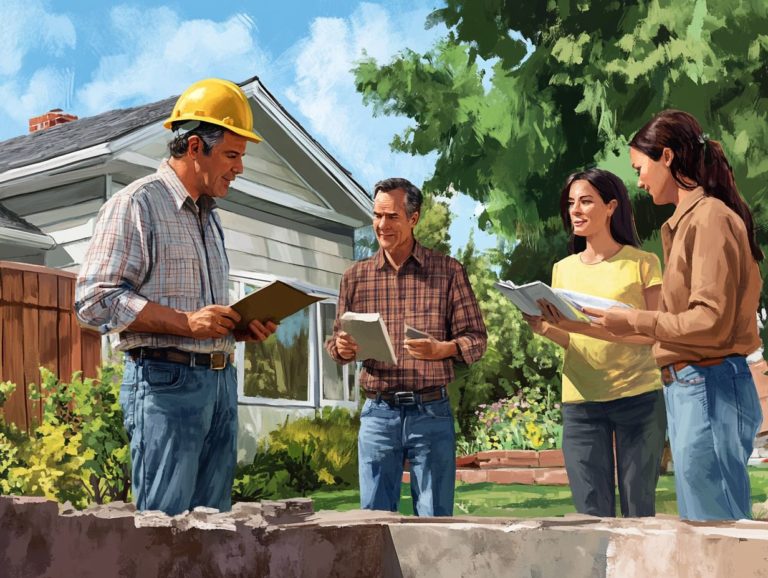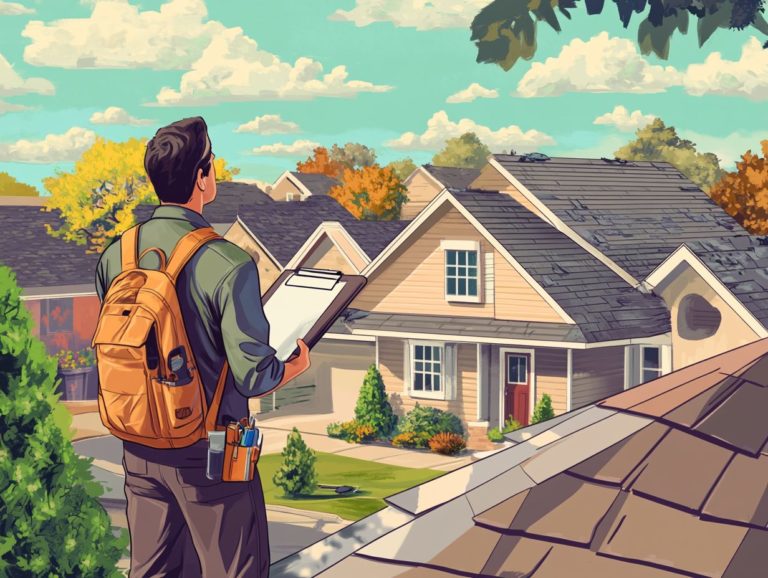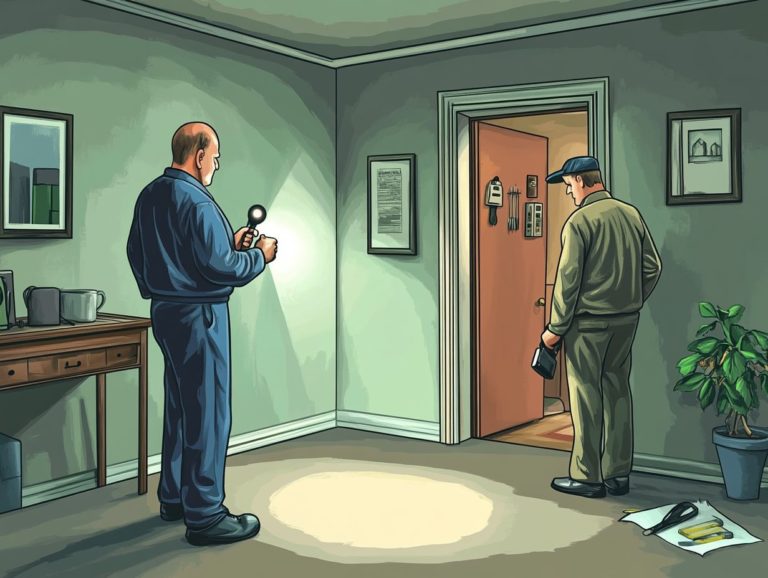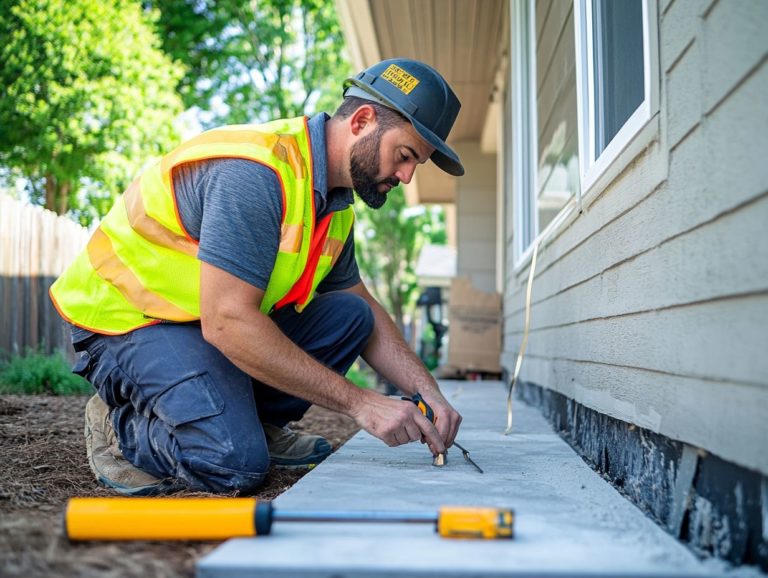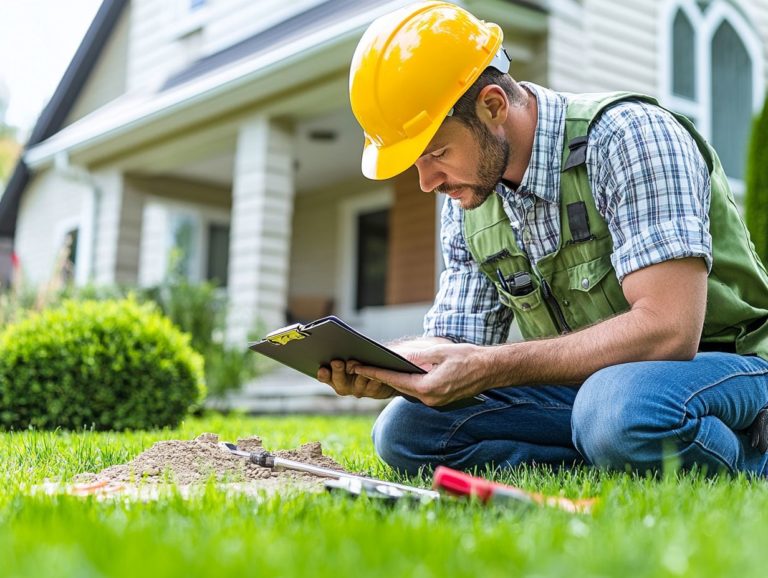The Importance of Home Inspections in Real Estate
Purchasing a home stands as one of the most significant investments you ll make in your lifetime. To ensure that this investment is secure, a thorough home inspection is absolutely essential.
In this article, we’ll explore what a home inspection entails, shedding light on its purpose and role in the real estate process.
You ll discover the benefits for both buyers and sellers, what to expect during an inspection, and how to select a qualified inspector. It also covers common issues that may arise during this critical evaluation.
Whether you re buying, selling, or simply curious, understanding home inspections is key. Don t wait empower yourself today!
Contents
- Key Takeaways You Can’t Ignore!
- What is a Home Inspection?
- The Role of Home Inspections in Real Estate
- Benefits of a Home Inspection
- What to Expect During a Home Inspection
- Choosing a Qualified Home Inspector
- Common Issues Found in Home Inspections
- Tips for a Successful Home Inspection
- Understanding Home Warranties
- Frequently Asked Questions
- What is the importance of home inspections in real estate?
- Who is responsible for scheduling a home inspection?
- What should I consider when choosing a home inspector?
- What areas of the home are typically included in a home inspection?
- Can a home inspection affect the sale of a property?
- Are there any benefits for sellers to have a home inspection done?
Key Takeaways You Can’t Ignore!

A home inspection is a vital process in the real estate industry that involves a thorough evaluation of a property’s condition to identify potential issues. Understanding the importance of home inspections in real estate deals plays a crucial role for both buyers and sellers, providing valuable information to make informed decisions and negotiate effectively.
By identifying potential issues and negotiating for repairs or price reductions, the role of home inspections in real estate transactions can save buyers and sellers from costly surprises and ensure a successful deal.
What is a Home Inspection?
A home inspection is an in-depth evaluation of a residential property’s condition, conducted by a certified inspector. This detailed check covers important parts like structural integrity, major systems, and safety concerns, all while adhering to TREC standards.
For homebuyers, this professional inspection is an essential step. It offers valuable insights that bolster their investment decisions and uncovers potential repairs that may be necessary. Understanding the key role of home inspections in real estate ultimately enhances your confidence as you navigate the homebuying process.
The Role of Home Inspections in Real Estate
Home inspections serve a crucial function in the real estate market, acting as a protective measure for both buyers and sellers during property transactions. Understanding the importance of home inspections in real estate transactions can provide you with peace of mind, as a comprehensive inspection report gives you a clear understanding of the property’s condition.
This insight gives you the power to make informed investment decisions, ensuring that you are equipped to manage the challenges of owning a home with confidence.
Benefits of a Home Inspection
A home inspection offers a wealth of advantages for both homebuyers and sellers. It acts as a critical tool in the property evaluation journey, highlighting the role of home inspections in real estate.
By pinpointing potential issues ranging from safety hazards to structural defects and providing a comprehensive inspection checklist, it gives you the power to make informed decisions.
This knowledge equips you to negotiate essential repairs or price reductions, enhancing the overall investment process. This way, you navigate your real estate endeavors with confidence and clarity.
Identifying Potential Issues
Identifying potential issues during a home inspection is essential for safeguarding your investment and ensuring the property’s long-term value. Understanding the importance of a home inspection for buyers, inspectors meticulously search for safety concerns, hidden problems, major defects, and potential repairs that could impact the integrity of your home systems.
You’ll want to pay particular attention to common issues like plumbing leaks that can lead to water damage and mold growth. Electrical systems may also present risks, such as faulty wiring or outdated components.
Roofing problems, including missing shingles or signs of deterioration, can jeopardize the overall protection of your home. Addressing these concerns during an inspection not only mitigates immediate safety hazards but also preserves your home s functionality and resale potential.
By taking a proactive approach, you can sidestep costly repairs and maintain a safe, comfortable living environment.
Negotiating for Repairs or Price Reduction

Home inspections lay the groundwork for negotiating essential repairs or price reductions. They empower you to approach sellers with concrete recommendations from your inspection.
By presenting insights from a professional home inspection, you can leverage identified issues to secure fair compensation in the transaction. These findings highlight structural deficiencies, safety hazards, or deferred maintenance, serving as your powerful negotiation tools.
Clearly communicating these issues emphasizes the need for repairs and illustrates potential cost implications for the seller. This opens the door to request concessions, such as lower prices or guarantees for necessary repairs before closing.
Mastering how to frame these inspection results is key. This skill allows you to advocate for yourself while fostering a collaborative environment.
What to Expect During a Home Inspection
Understanding what to expect during a home inspection can ease your concerns. It empowers you as a homebuyer to navigate this crucial evaluation process with confidence.
Typically, the inspection involves a thorough check of various home systems, including plumbing, electrical, HVAC, and structural components.
The inspector carefully notes visual cues that could signal underlying issues, providing valuable insights into the property’s condition.
The Inspection Process
The inspection process starts with an evaluation of the entire property. The inspector focuses on major systems like the roof, foundation, plumbing, electrical systems, and HVAC.
Using an inspection checklist, the certified inspector examines each area for compliance with building codes and identifies potential safety hazards. After this initial assessment, the inspector checks the condition of specific components within these systems.
For instance, they assess roofing materials for wear and potential leaks while investigating the foundation for signs of shifting or cracks. The plumbing system is checked for leaks, water pressure, and drainage efficiency.
The electrical systems are tested for proper grounding, wiring integrity, and outlet functionality. The HVAC systems are evaluated to ensure they operate efficiently.
Throughout the evaluation, the inspector notes their findings. They generate a detailed report that outlines deficiencies, necessary repairs, and overall safety considerations.
Choosing a Qualified Home Inspector
Selecting a qualified home inspector is crucial for an accurate property evaluation. It significantly influences the entire inspection process.
Consider factors such as the inspector’s qualifications, experience, and compliance with TREC standards to ensure a trustworthy assessment.
Factors to Consider
When selecting a home inspector, consider several factors to ensure you receive reliable inspection services. Key aspects include the inspector’s qualifications, level of experience, customer reviews, and any specializations they may have.
Verifying their certifications shows their professionalism and commitment to industry standards. It’s wise to ask if the inspector carries liability insurance for your protection.
Client testimonials provide insights into their thoroughness and professionalism. Specialized services in areas like electrical or plumbing systems can enhance the overall value of the inspection.
By focusing on these elements, you can make a well-informed decision.
Common Issues Found in Home Inspections
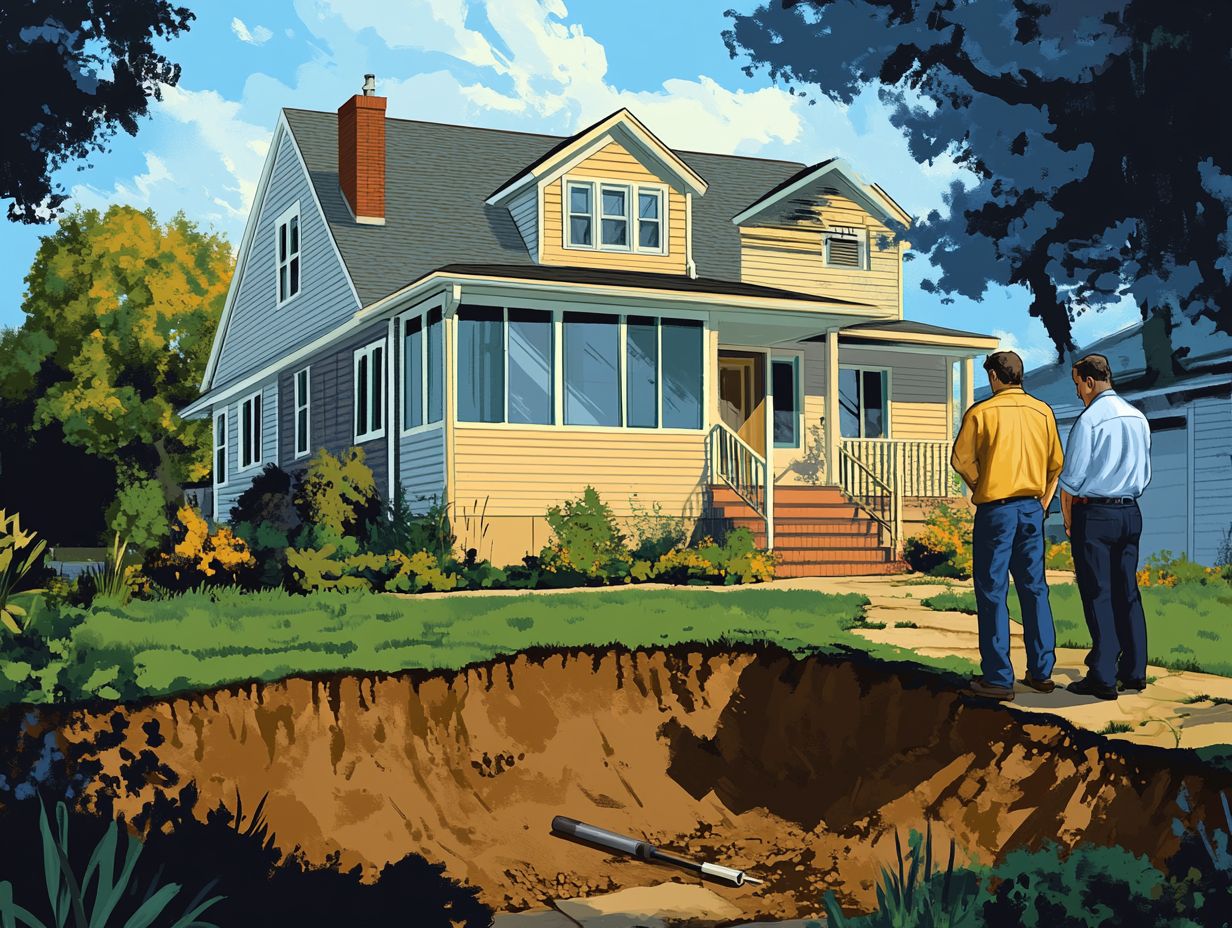
Home inspections often reveal common issues that can impact both property value and safety.
Major defects, safety hazards, and maintenance concerns frequently come to light, emphasizing the need for thorough inspections.
Examples and Solutions
- Faulty electrical systems
- Plumbing leaks
- Roof damage
These issues can jeopardize your property’s integrity. Effective solutions usually involve professional repairs, regular maintenance, and adherence to safety rules.
For instance, outdated wiring poses serious fire hazards. Upgrading to modern systems is essential to meet safety standards.
Plumbing leaks can lead to costly water damage. Regular checks and timely repairs can help you avoid expensive mold issues.
Roof damage affects not just structural integrity but also insulation. Scheduling regular inspections helps extend your roof’s lifespan and protects your property.
Addressing these issues promptly helps maintain your property’s value and ensures safe living conditions.
Tips for a Successful Home Inspection
Proper preparation is crucial for both buyers and sellers to guarantee a successful home inspection.
By clearing access to major systems and addressing minor repairs, you can create a smoother inspection process. This enhances the experience and leads to more favorable outcomes.
Preparing for the Inspection and Follow-Up Actions
Preparation involves ensuring every corner of the property is accessible and in good condition. After the inspection, obtaining contractor estimates for necessary repairs can help maintain your home s value.
Sellers should declutter spaces, ensure utilities are working, and make minor repairs to present their home well.
Buyers should approach inspections with a keen eye, as a thorough review can reveal potential issues that may influence their decision. Effective communication post-inspection is vital for both parties.
Prioritizing urgent repairs is key. Getting reliable contractor estimates aids in budgeting and promotes transparency during negotiations, leading to informed decisions.
Understanding Home Warranties
Home warranties are essential for homeowners, providing coverage for repairs and maintenance on major systems and appliances after inspections.
A thorough home inspection can clarify whether a warranty is necessary and what it should cover to protect against unexpected expenses. While inspections highlight existing issues, warranties shield you from future financial surprises.
This dual approach ensures significant systems like plumbing and electrical work properly while having a safety net in place for peace of mind.
Coverage details may vary, but many warranties include:
- Appliances
- Heating systems
- Structural elements
Understanding the connection between inspections and warranty protection enables informed decisions that enhance your home’s longevity and safeguard your investment.
Frequently Asked Questions

What is the importance of home inspections in real estate?
Home inspections are vital in real estate, providing buyers with important information about a property’s condition. This helps avoid costly repairs or safety risks, highlighting the importance of home inspections in real estate.
Who is responsible for scheduling a home inspection?
Usually, the buyer schedules the home inspection. Sometimes, sellers conduct a pre-listing inspection to fix issues before the sale.
What should I consider when choosing a home inspector?
Choose a home inspector based on their qualifications and experience. Check reviews and get referrals from trusted sources.
What areas of the home are typically included in a home inspection?
A standard home inspection covers the foundation, roof, plumbing, electrical systems, and heating and cooling systems. Talk to your inspector about specific areas you want included.
Can a home inspection affect the sale of a property?
A home inspection can impact a property sale. If major issues arise, it might lead to renegotiating the price or even canceling the sale.
Are there any benefits for sellers to have a home inspection done?
Sellers can benefit from having a home inspection. It helps them fix issues before listing, lowering the risk of the sale falling through due to repairs.


